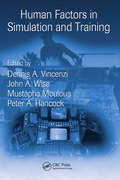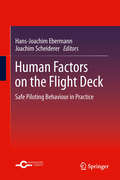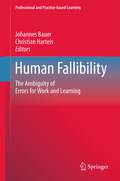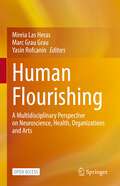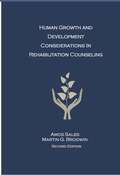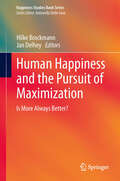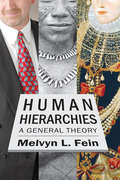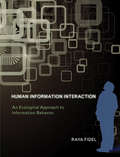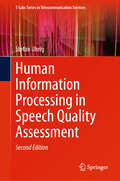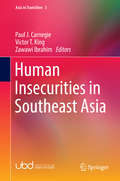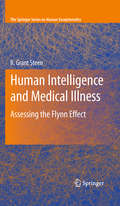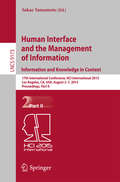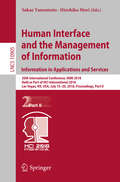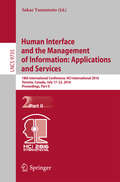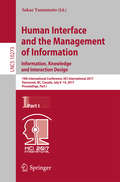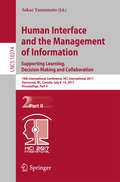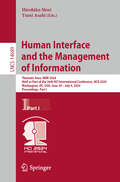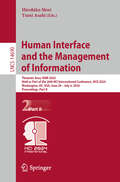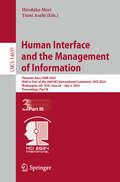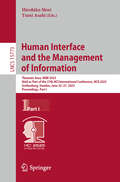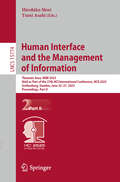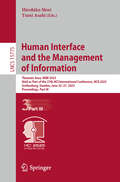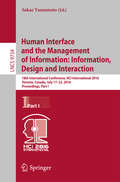- Table View
- List View
Human Factors in Simulation and Training
by Peter A. Hancock Mustapha Mouloua Dennis A. Vincenzi John A. WiseMeasure twice, cut once. Although applicable to all areas of human factors research, the old adage is especially relevant to simulation and training. As a tool, simulation is an aid to the imagination, however, if incorrectly or inadequately used, it can lead to inaccurate outcomes that not only limit the possibilities but potentially cause harm. A
Human Factors on the Flight Deck
by Joachim Scheiderer Hans-Joachim EbermannWhat is for a professional pilot required to fly as safe as possible? Written by pilots the book gives a detailed introduction into the basics of accident prevention in air traffic. Explicit background knowledge as well as detailed listings of safety relevant features in human behaviour are included.
Human Fallibility: The Ambiguity of Errors for Work and Learning
by Christian Harteis Johannes BauerA curious ambiguity surrounds errors in professional working contexts: they must be avoided in case they lead to adverse (and potentially disastrous) results, yet they also hold the key to improving our knowledge and procedures. In a further irony, it seems that a prerequisite for circumventing errors is our remaining open to their potential occurrence and learning from them when they do happen. This volume, the first to integrate interdisciplinary perspectives on learning from errors at work, presents theoretical concepts and empirical evidence in an attempt to establish under what conditions professionals deal with errors at work productively--in other words, learn the lessons they contain. By drawing upon and combining cognitive and action-oriented approaches to human error with theories of adult, professional, and workplace learning this book provides valuable insights which can be applied by workers and professionals. It includes systematic theoretical frameworks for explaining learning from errors in daily working life, methodologies and research instruments that facilitate the measurement of that learning, and empirical studies that investigate relevant determinants of learning from errors in different professions. Written by an international group of distinguished researchers from various disciplines, the chapters paint a comprehensive picture of the current state of the art in research on human fallibility and (learning from) errors at work.
Human Flourishing: A Multidisciplinary Perspective on Neuroscience, Health, Organizations and Arts
by Marc Grau Grau Yasin Rofcanin Mireia Las HerasThis open access book presents a novel multidisciplinary perspective on the importance of human flourishing. The study of the good life or Eudaimonia has been a central concern at least since Aristotelian times. This responds to the common experience that we all seek happiness. Today, we are immersed in a new paradoxical boom, where the pursuit of happiness seems to permeate everything (books, media, organizations, talks), but at the same time, it is nowhere, or at least very difficult to achieve. In fact, it is not easy to even find a consensus regarding the meaning of the word happiness. Seligman (2011), one of the fathers of the positive psychology, confirmed that his original view the meaning he referred to was close to that of Aristotle. But, he recently confessed that he now detests the word happiness, since it is overused and has become almost meaningless. The aim of this open access book is to shed new light on human flourishing through the lenses of neurosciences and health, organizations, and arts. The novelty of this book is to offer a multi-disciplinary perspective on the importance of human flourishing in our lives. The book will examine further how different initiatives, policies and practices create opportunities for generating human flourishing.
Human Genes and Neoliberal Governance: A Foucauldian Critique
by Antoinette RouvroyOriginal and interdisciplinary, this is the first book to explore the relationship between a neoliberal mode of governance and the so-called genetic revolution. Looking at the knowledge-power relations in the post-genomic era and addressing the pressing issues of genetic privacy and discrimination in the context of neoliberal governance, this book demonstrates and explains the mechanisms of mutual production between biotechnology and cultural, political, economic and legal frameworks. In the first part Antoinette Rouvroy explores the social, political and economic conditions and consequences of this new ‘perceptual regime’. In the second she pursues her analysis through a consideration of the impact of ‘geneticization’ on political support of the welfare state and on the operation of private health and life insurances. Genetics and neoliberalism, she argues, are complicit in fostering the belief that social and economic patterns have a fixed nature beyond the reach of democratic deliberation, whilst the characteristics of individuals are unusually plastic, and within the scope of individual choice and responsibility. This book will be of interest to all students of law, sociology and politics.
Human Growth and Development in Rehabilitation Counseling
by Martin G. Brodwin Amos SalesHuman Growth and Development in Rehabilitation Counseling, 2nd Edition
Human Happiness and the Pursuit of Maximization: Is More Always Better?
by Hilke Brockmann Jan DelheyThis book tests the critical potential of happiness research to evaluate contemporary high-performance societies. These societies, defined as affluent capitalist societies, emphasize competition and success both institutionally and culturally. Growing affluence improves life in many ways, for a large number of people. We lead longer, safer, and more comfortable lives than previous generations. But we also live faster, and are competition-toughened, like top athletes. As a result, we suspect limits and detect downsides of our high-speed lives. The ubiquitous maximization principle opens up a systematic gateway to the pleasures and pains of contemporary life. Using happiness as a reference point, this book explores the philosophical and empirical limits of the maximization rule. It considers the answer to questions such as: Precisely, why did the idea of (economic) maximization gain so much ground in our Western way of thinking? When, and in which life domains, does maximization work, when does it fail? When do qualities and when do quantities matter? Does maximization yield a different (un)happiness dividend in different species, cultures, and societies?
Human Hierarchies: A General Theory
by Melvyn L. FeinHuman beings are hierarchical animals. Always and everywhere, people have developed social ranking systems. These differ dramatically in how they are organized, but the underlying causal mechanisms that create and sustain them are the same. Whether they are on the top or bottom of the heap, people attempt to be superior to some other persons or group. This is the root of Melvyn L. Fein's thesis presented in Human Hierarchies: A General Theory. Fein traces the development of changes from hunter-gatherer times to our own techno-commercial society. In moving from small to large communities, humans went from face-to-face contests for superiority to more anonymous and symbolic ones. Societies evolved from hunting bands where the parties knew each other through big-men societies, chieftainships, agrarian empires, patronage chains, caste societies, estate systems, and market-oriented democracies. Where once small groupings were organized primarily by strong forces such as personal relationships, the now standard large groupings are more dependent on weaker forces such as those provided by social roles. Bureaucracies and professional roles have become prominent. Bureaucracies allow large-scale organizations to maintain control of people by limiting the potential destructiveness of unregulated tests of strength and by clarifying chains of command. Their rigidity and unresponsiveness requires that they be supplemented by professional roles. At the same time, a proliferation of self-motivated experts delegate authority downward, thereby introducing a more flexible decentralization. This analysis is a unique and significant advance in both the sociology and anthropology of stratification among humans.
Human Information Interaction: An Ecological Approach to Information Behavior (The\mit Press Ser.)
by Raya FidelA fresh research approach that bridges the study of human information interaction and the design of information systems.Human information interaction (HII) is an emerging area of study that investigates how people interact with information; its subfield human information behavior (HIB) is a flourishing, active discipline. Yet despite their obvious relevance to the design of information systems, these research areas have had almost no impact on systems design. One issue may be the contextual complexity of human interaction with information; another may be the difficulty in translating real-life and unstructured HII complexity into formal, linear structures necessary for systems design. In this book, Raya Fidel proposes a research approach that bridges the study of human information interaction and the design of information systems: cognitive work analysis (CWA). Developed by Jens Rasmussen and his colleagues, CWA embraces complexity and provides a conceptual framework and analytical tools that can harness it to create design requirements. CWA offers an ecological approach to design, analyzing the forces in the environment that shape human interaction with information.Fidel reviews research in HIB, focusing on its contribution to systems design, and then presents the CWA framework. She shows that CWA, with its ecological approach, can be used to overcome design challenges and lead to the development of effective systems. Researchers and designers who use CWA can increase the diversity of their analytical tools, providing them with an alternative approach when they plan research and design projects. The CWA framework enables a collaboration between design and HII that can create information systems tailored to fit human lives.
Human Information Processing in Speech Quality Assessment (T-Labs Series in Telecommunication Services)
by Stefan UhrigThis updated book introduces a new process-oriented approach towards speech quality assessment. Using multiple methods, this approach allows readers to investigate the influence of speech transmission quality on perceptual and cognitive processes in human listeners. Fundamental concepts and methods related to the topic of process-oriented speech quality assessment are introduced and discussed. Moreover, a functional process model of speech quality perception is described, which theoretically integrates the results obtained in three experimental studies. This book’s conceptual ideas, empirical findings, and theoretical interpretations should be of particular interest to researchers working in the fields of Quality and Usability Engineering, Audio Engineering, Psychoacoustics, Psychophysiology, and Audiology.
Human Insecurities in Southeast Asia
by Victor T. King Zawawi Ibrahim Paul J. CarnegieThis book is a collection of work by scholars currently pursuing research on human security and insecurities in Southeast Asia. It deals with a set of insecurities that is not readily understood or measurable. As such, it conceptually locates the threats and impediments to human security within relationships of risk, uncertainty, safety and trust. At the same time, it presents a wide variety of investigations and approaches from both localized and regional perspectives. By focusing on the human and relational dimensions of insecurities in Southeast Asia it highlights the ways in which vulnerable and precarious circumstances (human insecurities) are part of daily life for large numbers of people in Southeast Asia and are mainly beyond their immediate control. Many of the situations people experience in Southeast Asia represent the real outcomes of a range of largely unacknowledged socio-cultural-economic transformations interlinked by local, national, regional and global forces, factors and interests. Woven from experience and observations of life at various sites in Southeast Asia, the contributions in this volume give an internal and critical perspective to a complex and manifold issue. They draw attention to a variety of the less-than-obvious threats to human security and show how perplexing those threats can be. All of which underscores the significance of multidisciplinary approaches in rethinking and responding to the complex array of conditioning factors and interests underlying human insecurities in Southeast Asia. "
Human Intelligence and Medical Illness
by R. Grant SteenThere's little doubt that people are growing smarter. This effect is so strong that IQ tests must be renormed periodically to prevent classifying an overabundance of people as geniuses. The question is why is this collective rise in IQ - known as the Flynn effect -occurring? Possible theories to explain the Flynn effect have ranged from better parenting to faster evolution. Bringing a bold new voice to the debate, Human Intelligence and Medical Illness sets out a simple definition of intelligence that is appropriate for assessing intelligence at the population level. The definition is then used to probe the relationship between population intelligence and public health. This volume uses the latest medical and behavioral science research to argue that declines in serious disease and illness-causing conditions (e.g., lead paint in buildings) correlate strongly with continued cognitive gains in both developed and developing countries. Current political realities explain why the Flynn effect should be approached as a public policy as well as a public health issue. This provocative volume: Reviews the most widely held hypotheses accounting for the Flynn effect. Examines the relationship between intelligence and public health. Assesses the extent to which public health improvements can potentially account for the Flynn effect. Details how treatment of common medical problems may result in a substantial rise in IQ. Explores the possibility of continued IQ gains in the United States and worldwide. Reframes the Flynn effect in the contexts of public health, early childhood education, and social justice. With its groundbreaking findings on the causes of cognitive impairment and the possibility of cognitive improvement, Human Intelligence and Medical Illness is must-reading for researchers, professors, and graduate students in developmental psychology, education, public health, psychiatry, neuroscience, social work, and related fields.
Human Interface and the Management of Information. Information and Knowledge in Context
by Sakae YamamotoThe two-volume set LNCS 9172 and 9173 constitutes the refereed proceedings of the Human Interface and the Management of Information thematic track, held as part of the 17th International Conference on Human-Computer Interaction, HCII 2015, held in Los Angeles, CA, USA, in August 2015, jointly with 15 other thematically similar conferences. The total of 1462 papers and 246 posters presented at the HCII 2015 conferences were carefully reviewed and selected from 4843 submissions. These papers address the latest research and development efforts and highlight the human aspects of design and use of computing systems. The papers accepted for presentation thoroughly cover the entire field of human-computer interaction, addressing major advances in knowledge and effective use of computers in a variety of application areas. This volume contains papers addressing the following major topics: context modelling and situational awareness; decision-support systems; information and interaction for driving; information and interaction for learning and education; information and interaction for culture and art; supporting work and collaboration; information and interaction for safety, security and reliability; information and interaction for novel advanced environments.
Human Interface and the Management of Information. Information in Applications and Services: 20th International Conference, HIMI 2018, Held as Part of HCI International 2018, Las Vegas, NV, USA, July 15-20, 2018, Proceedings, Part II (Lecture Notes in Computer Science #10905)
by Sakae Yamamoto Hirohiko MoriThis two-volume set LNCS 10904 and 10905 constitutes the refereed proceedings of the 20th International Conference on Human Interface and the Management of Information, HIMI 2018, held as part of HCI International 2018 in Las Vegas, NV, USA, in July 2018.The total of 1170 papers and 195 posters included in the 30 HCII 2018 proceedings volumes was carefully reviewed and selected from 4373 submissions.The 53 papers presented in this volume were organized in topical sections named: interacting with information; information and learning; information in aviation and transport; intelligent systems; and sevice management.
Human Interface and the Management of Information: Applications and Services
by Sakae YamamotoThe two-volume set LNCS 8521 and 8522 constitutes the refereed proceedings of the Human Interface and the Management of Information thematic track, held as part of the 16th International Conference on Human-Computer Interaction, HCII 2014, held in Heraklion, Greece, in June 2014, jointly with 13 other thematically similar conferences. The total of 1476 papers and 220 posters presented at the HCII 2014 conferences were carefully reviewed and selected from 4766 submissions. These papers address the latest research and development efforts and highlight the human aspects of design and use of computing systems. The papers accepted for presentation thoroughly cover the entire field of human-computer interaction, addressing major advances in knowledge and effective use of computers in a variety of application areas. This volume contains papers addressing the following major topics: e-learning and e-education; decision support; information and interaction in aviation and transport; safety, security and reliability; communication, expression and emotions; art, culture and creativity; information and knowledge in business and society.
Human Interface and the Management of Information: Information, Knowledge and Interaction Design
by Sakae YamamotoThe two-volume set LNCS 10273 and 10274 constitutes the refereed proceedings of the thematic track on Human Interface and the Management of Information, held as part of the 19th HCI International 2017, in Vancouver, BC, Canada, in July 2017. HCII 2017 received a total of 4340 submissions, of which 1228 papers were accepted for publication after a careful reviewing process. The 102 papers presented in these volumes were organized in topical sections as follows: Part I: Visualization Methods and Tools; Information and Interaction Design; Knowledge and Service Management; Multimodal and Embodied Interaction. Part II: Information and Learning; Information in Virtual and Augmented Reality; Recommender and Decision Support Systems; Intelligent Systems; Supporting Collaboration and User Communities; Case Studies.
Human Interface and the Management of Information: Supporting Learning, Decision-Making and Collaboration
by Sakae YamamotoThe two-volume set LNCS 10273 and 10274 constitutes the refereed proceedings of the thematic track on Human Interface and the Management of Information, held as part of the 19th HCI International 2017, in Vancouver, BC, Canada, in July 2017. HCII 2017 received a total of 4340 submissions, of which 1228 papers were accepted for publication after a careful reviewing process. The 102 papers presented in these volumes were organized in topical sections as follows: Part I: Visualization Methods and Tools; Information and Interaction Design; Knowledge and Service Management; Multimodal and Embodied Interaction. Part II: Information and Learning; Information in Virtual and Augmented Reality; Recommender and Decision Support Systems; Intelligent Systems; Supporting Collaboration and User Communities; Case Studies.
Human Interface and the Management of Information: Thematic Area, HIMI 2024, Held as Part of the 26th HCI International Conference, HCII 2024, Washington, DC, USA, June 29–July 4, 2024, Proceedings, Part I (Lecture Notes in Computer Science #14689)
by Hirohiko Mori Yumi AsahiThis three-volume set LNCS 14789-14791 constitutes the thoroughly refereed proceedings of the thematic area Human Interface and the Management of Information, HIMI 2024, held as part of the 26th International Conference on Human-Computer Interaction, HCI International 2024 (HCII 2024), was held as a hybrid event in Washington DC, USA, during June/July 2024. The total of 1271 papers and 309 posters included in the HCII 2023 proceedings was carefully reviewed and selected from 5108 submissions. The HIMI conference addressed approaches and objectives of information and data design, retrieval, presentation and visualization, management, and evaluation in human computer interaction in a variety of application domains, such as, for example, learning, work, decision, collaboration, medical support, and service engineering, and much more.
Human Interface and the Management of Information: Thematic Area, HIMI 2024, Held as Part of the 26th HCI International Conference, HCII 2024, Washington, DC, USA, June 29–July 4, 2024, Proceedings, Part II (Lecture Notes in Computer Science #14690)
by Hirohiko Mori Yumi AsahiThis three-volume set LNCS 14789-14791 constitutes the thoroughly refereed proceedings of the thematic area Human Interface and the Management of Information, HIMI 2024, held as part of the 26th International Conference on Human-Computer Interaction, HCI International 2024 (HCII 2024), was held as a hybrid event in Washington DC, USA, during June/July 2024. The total of 1271 papers and 309 posters included in the HCII 2023 proceedings was carefully reviewed and selected from 5108 submissions. The HIMI conference addressed approaches and objectives of information and data design, retrieval, presentation and visualization, management, and evaluation in human computer interaction in a variety of application domains, such as, for example, learning, work, decision, collaboration, medical support, and service engineering, and much more.
Human Interface and the Management of Information: Thematic Area, HIMI 2024, Held as Part of the 26th HCI International Conference, HCII 2024, Washington, DC, USA, June 29–July 4, 2024, Proceedings, Part III (Lecture Notes in Computer Science #14691)
by Hirohiko Mori Yumi AsahiThis three-volume set LNCS 14789-14791 constitutes the thoroughly refereed proceedings of the thematic area Human Interface and the Management of Information, HIMI 2024, held as part of the 26th International Conference on Human-Computer Interaction, HCI International 2024 (HCII 2024), was held as a hybrid event in Washington DC, USA, during June/July 2024. The total of 1271 papers and 309 posters included in the HCII 2023 proceedings was carefully reviewed and selected from 5108 submissions. The HIMI conference addressed approaches and objectives of information and data design, retrieval, presentation and visualization, management, and evaluation in human computer interaction in a variety of application domains, such as, for example, learning, work, decision, collaboration, medical support, and service engineering, and much more.
Human Interface and the Management of Information: Thematic Area, HIMI 2025, Held as Part of the 27th HCI International Conference, HCII 2025, Gothenburg, Sweden, June 22–27, 2025, Proceedings, Part I (Lecture Notes in Computer Science #15773)
by Hirohiko Mori Yumi AsahiThe three-volume set LNCS 15773 - 15775 constitutes the thoroughly refereed proceedings of the thematic area Human Interface and the Management of Information, HIMI 2025, held as part of the 27th International Conference on Human-Computer Interaction, HCI International 2025 (HCII 2025), which was held in Gothenburg, Sweden, during June 22–27, 2025. The total of 1430 papers and 355 posters included in the HCII 2025 proceedings was carefully reviewed and selected from 7972 submissions. The papers in these proceedings have been organized in topical sections as follows: Part I: Information design and visualization; human-human and human-AI collaboration; user experience design and evaluation; Part II: Information in eHealth; information, knowledge and learning; Part III: Multimodality and information; eCommerce and industrial applications.
Human Interface and the Management of Information: Thematic Area, HIMI 2025, Held as Part of the 27th HCI International Conference, HCII 2025, Gothenburg, Sweden, June 22–27, 2025, Proceedings, Part II (Lecture Notes in Computer Science #15774)
by Hirohiko Mori Yumi AsahiThe three-volume set LNCS 15773 - 15775 constitutes the thoroughly refereed proceedings of the thematic area Human Interface and the Management of Information, HIMI 2025, held as part of the 27th International Conference on Human-Computer Interaction, HCI International 2025 (HCII 2025), which was held in Gothenburg, Sweden, during June 22–27, 2025. The total of 1430 papers and 355 posters included in the HCII 2025 proceedings was carefully reviewed and selected from 7972 submissions. The papers in these proceedings have been organized in topical sections as follows: Part I: Information design and visualization; human-human and human-AI collaboration; user experience design and evaluation; Part II: Information in eHealth; information, knowledge and learning; Part III: Multimodality and information; eCommerce and industrial applications.
Human Interface and the Management of Information: Thematic Area, HIMI 2025, Held as Part of the 27th HCI International Conference, HCII 2025, Gothenburg, Sweden, June 22–27, 2025, Proceedings, Part III (Lecture Notes in Computer Science #15775)
by Hirohiko Mori Yumi AsahiThe three-volume set LNCS 15773 - 15775 constitutes the thoroughly refereed proceedings of the thematic area Human Interface and the Management of Information, HIMI 2025, held as part of the 27th International Conference on Human-Computer Interaction, HCI International 2025 (HCII 2025), which was held in Gothenburg, Sweden, during June 22–27, 2025. The total of 1430 papers and 355 posters included in the HCII 2025 proceedings was carefully reviewed and selected from 7972 submissions. The papers in these proceedings have been organized in topical sections as follows: Part I: Information design and visualization; human-human and human-AI collaboration; user experience design and evaluation; Part II: Information in eHealth; information, knowledge and learning; Part III: Multimodality and information; eCommerce and industrial applications.
Human Interface and the Management of Information:Information, Design and Interaction
by Sakae YamamotoThe three-volume set LNCS 8016, 8017, and 8018 constitutes the refereed proceedings of the 15th International Conference on Human-Computer Interaction, HCII 2013, held in Las Vegas, NV, USA in July 2013. The total of 1666 papers and 303 posters presented at the HCII 2013 conferences was carefully reviewed and selected from 5210 submissions. These papers address the latest research and development efforts and highlight the human aspects of design and use of computing systems. The papers accepted for presentation thoroughly cover the entire field of human-computer Interaction, addressing major advances in knowledge and effective use of computers in a variety of application areas. This volume contains papers in the thematic area of human interface and the management of Information, addressing the following major topics: interacting with information, information searching, browsing and structuring, design and development methods and tools for interactive systems and services, personalized information and interaction, cognitive and emotional aspects of interacting with information.
Human Intimacy (Eleventh Edition): Marriage, The Family, And Its Meaning
by Frank D. Cox Kevin DemmittOffering a positive view of the family, Cox's HUMAN INTIMACY: MARRIAGE, THE FAMILY, AND ITS MEANING, Eleventh Edition discusses the characteristics of successful intimate relationships, and teaches the decision-making skills that lead to strong marriages and families. You'll find coverage of such topics as diversity within the American family (including rural and military families), gay marriage, singles, cohabitation, gender roles, theories of love, date rape and courtship violence, and parenting and life stages.
